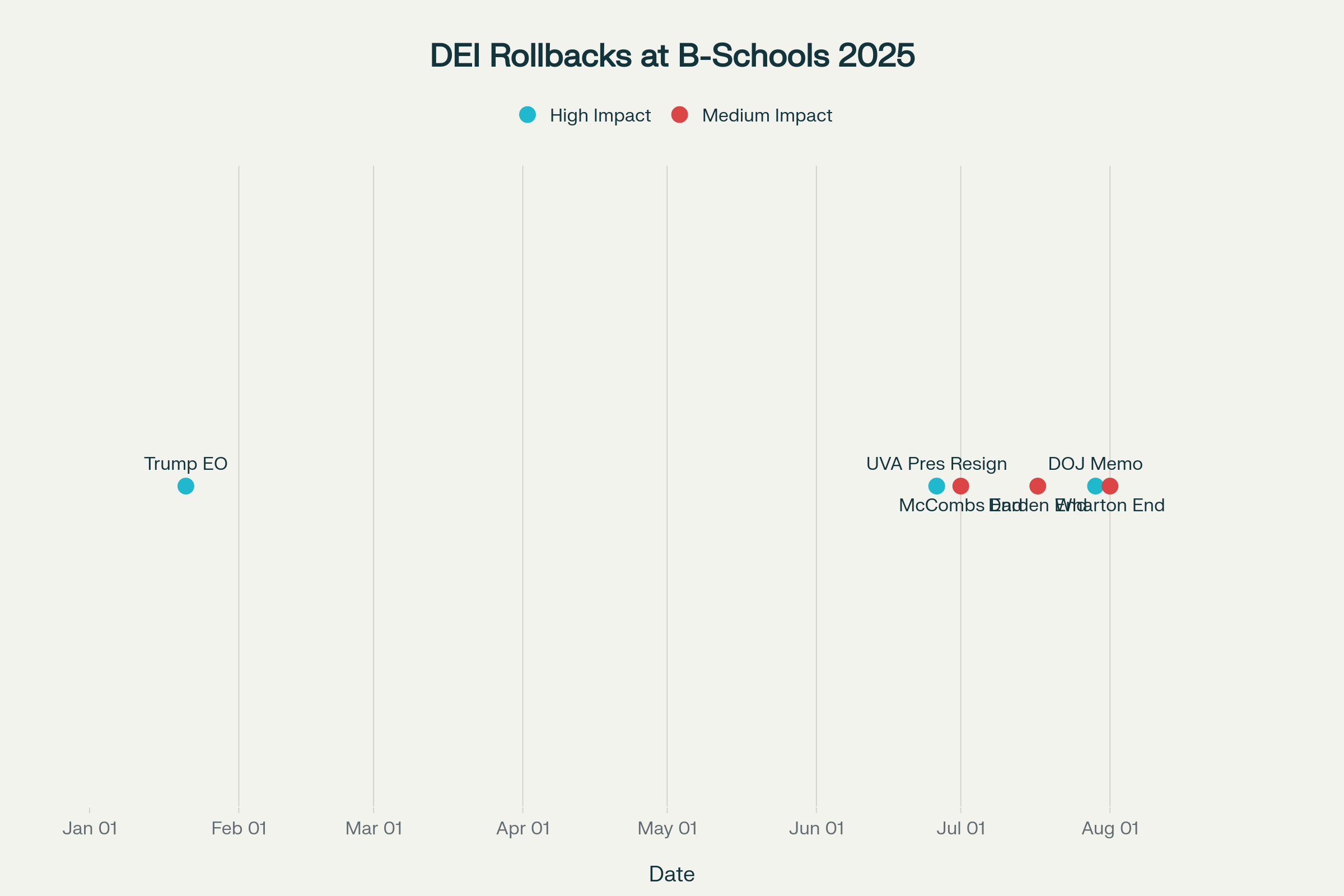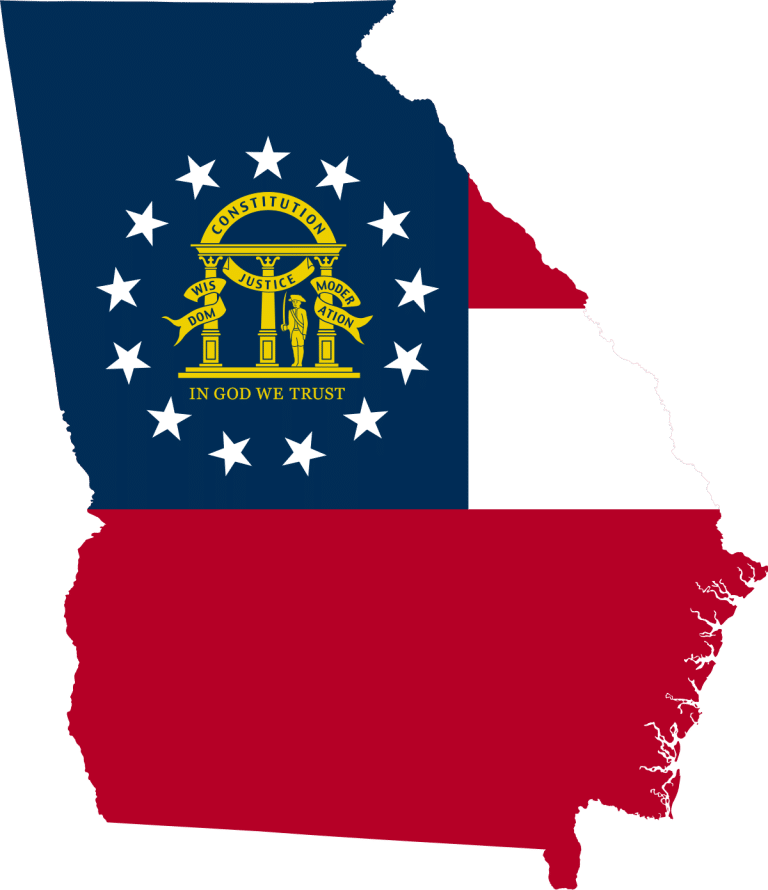Wharton becomes latest top MBA program to sever ties with women’s leadership organization amid Trump administration’s intensifying crackdown on diversity initiatives
The University of Pennsylvania’s Wharton School has ended its membership with the Forté Foundation, becoming the third elite business school in recent weeks to cut ties with diversity-focused organizations as the Trump administration escalates its war against DEI programs in higher education.
The move, confirmed by Wharton officials on August 1, follows a pattern of prestigious institutions abandoning long-standing partnerships with groups that support underrepresented students. According to an article in Poets&Quants, University of Virginia’s Darden School of Business suspended its relationships with both the Forté Foundation and The Consortium for Graduate Study in Management on July 17, while the University of Texas at Austin’s McCombs School ended its 40-year partnership with The Consortium on July 1.

Timeline of Major DEI Rollbacks at Business Schools in 2025
The rapid succession of departures marks what observers are calling a “Summer of DEI Rollbacks” among business schools, driven by mounting federal pressure and threats to institutional funding that have forced administrators to abandon programs they once championed.
Federal Memo Declares DEI Programs Unlawful
The business school departures coincided with a sweeping Department of Justice memo issued on July 29 that declared numerous diversity, equity, and inclusion practices potentially unlawful under federal civil rights laws. According to an article in JD Supra, the nine-page directive from Attorney General Pamela Bondi warns that any organization receiving federal funds—which includes virtually every major university—could face funding cuts for maintaining programs that consider race, gender, or other protected characteristics.
“In recent years, the federal government has turned a blind eye toward, or even encouraged, various discriminatory practices, seemingly because of their purportedly benign labels, objectives, or intentions,” the memo states. “No longer. Going forward, the federal government will not stand by while recipients of federal funds engage in discrimination.”
The guidance specifically targets race-conscious scholarships, identity-based mentorship programs, and diversity requirements in hiring—practices that have been standard at business schools for decades. According to an article in Poets&Quants for Undergrads, the memo suggests that even geographic recruitment strategies focusing on minority-majority areas could violate federal law.
Impact on Major Scholarship Programs
The policy shift threatens to dismantle scholarship programs that have channeled hundreds of millions of dollars to underrepresented MBA students. According to information from the Forté Foundation, the organization alone has awarded $475 million in fellowships to more than 19,000 MBA students since its founding, while The Consortium has provided full-tuition scholarships to thousands of Black, Hispanic, and Native American students pursuing business education.
“This suspension is not a reflection of the value or quality of our work together,” The Consortium wrote to prospective applicants after Darden’s departure. “UVA Darden has made clear that this decision is purely driven by the scrutiny and evaluations of their programs, policies and practices, not by any dissatisfaction with our partnership or mission.”
The Consortium, which now includes 23 member schools following the recent departures, was founded in 1966 specifically to address the lack of minority representation in corporate leadership. Its fellowship program provides full-tuition scholarships, professional development, and networking opportunities to underrepresented minorities at top business schools.
University Leaders Forced Out Under Pressure
Add to follow-up
The Trump administration has demonstrated its willingness to target individual university leaders who resist DEI dismantling efforts. University of Virginia President James Ryan announced his resignation on June 26 after facing a Department of Justice investigation into the university’s diversity policies—the first time federal officials have explicitly tied grant funding to the removal of a university official.
Ryan’s departure sent shockwaves through higher education, with critics describing it as an unprecedented assault on academic freedom and institutional autonomy. The ultra-conservative America First Legal organization had filed a 98-page letter with the DOJ specifically calling out Darden’s partnerships with groups like The Consortium and Forté Foundation as evidence of ongoing DEI violations.
“Such direct DOJ intervention is a threat to both academic freedom and institutional autonomy,” higher education experts warned. The message to other university leaders was clear: comply with federal demands or face similar consequences.
Financial Stakes Drive Institutional Decisions
The financial pressure facing universities has proven decisive in forcing compliance. Case Western Reserve University, which closed its DEI office last month, cited the imperative to maintain its $250 million in annual federal research funding—representing 16% of the institution’s total revenue.
“We must comply with these orders to secure the federal funding that is vital for our present and future,” stated Case Western’s president Eric Kaler in a campus communication.
The University of Pennsylvania, Wharton’s home institution, experienced this pressure firsthand earlier this year when the Trump administration paused $175 million in federal funding over the university’s transgender athlete policies. Penn ultimately agreed to ban transgender women from competing in female sports to restore the funding.
Students Report Loss of Support Systems
The DEI rollbacks are already affecting current students, particularly those from underrepresented backgrounds who relied on campus support systems now being dismantled. According to an article by the Associated Press, Tyler English, a senior at UVA, reported that students have been told scholarships and graduate programs focused on minority students are being scaled back or eliminated.
“For some of us, we now question whether our identities and voices are genuinely valued in this environment,” remarked English, a member of the campus Black Student Alliance.
At the University of Michigan, which is shutting down its DEI office, students describe losing essential resources. “It feels like we’re regressing,” stated one student whose diversity-focused scholarship program faces uncertain future funding. “It’s as if our voices are being ignored.”
Implications for MBA Applicants
The changes create significant uncertainty for prospective MBA students, particularly women and minorities who have traditionally relied on partnerships like Forté and The Consortium for both financial support and community building during their business school experience.
Business schools that maintain these partnerships may find themselves at competitive disadvantage as federal investigations target institutions with diversity-focused programs. However, schools that completely abandon diversity efforts risk losing talented applicants who value inclusive environments and may face consumer backlash from students and alumni.
Scholarship Landscape Uncertain
The loss of institutional partnerships doesn’t necessarily eliminate all scholarship opportunities, as some programs may continue through private funding. However, the scope and availability of these opportunities will likely be significantly reduced. Students planning to apply for MBA programs should research individual school policies carefully, as the landscape continues to shift rapidly.
Many schools are attempting to thread the needle by maintaining support for underrepresented students through alternative means that don’t explicitly consider race or gender. Some institutions are increasing need-based financial aid or focusing on geographic diversity as legally safer alternatives.
Broader Trend Across Higher Education
According to an article in The Chronicle of Higher Education tracking DEI changes, 387 college campuses in 45 states have dismantled or scaled back DEI programs since January 2023. The trend has accelerated dramatically in 2025, with Harvard University’s graduate schools closing their DEI offices and relabeling “diversity and inclusion” staff as “community and culture” personnel.
The rollbacks extend beyond elite institutions, with state laws in multiple jurisdictions specifically prohibiting DEI programs at public universities. However, private institutions that depend on federal research funding and student aid have found themselves equally vulnerable to federal pressure.
Corporate World Also Retreating
The changes in higher education mirror similar rollbacks in corporate America. According to an article in Forbes, companies including Meta, Amazon, McDonald’s, and Walmart have significantly reduced their DEI commitments. This parallel retreat suggests that MBA graduates may enter a business world where diversity programs are less prominent than in recent years.
Some companies like Costco have maintained their DEI commitments despite shareholder pressure, potentially creating opportunities for graduates from programs that continue emphasizing inclusive leadership.
Looking Ahead
As business schools navigate this rapidly changing landscape, prospective MBA applicants face the challenge of identifying programs that align with their values while also maintaining viable pathways to admission and funding. The institutions that successfully balance legal compliance with inclusive practices may emerge as preferred destinations for diverse talent.
The full impact of these changes will likely become clearer as the 2026 application cycle progresses and schools finalize their approaches to diversity and inclusion under the new federal guidelines. For now, the message from elite business schools is unmistakable: the era of explicit diversity programming has ended, at least temporarily, as institutions prioritize federal funding over inclusion initiatives.
References
- Poets&Quants. “Wharton Ends Forté Membership In Summer Of DEI Rollbacks.” August 1, 2025.
- Poets&Quants. “Virginia Darden Confirms Suspension From The Consortium — And Forté — Amid Mounting DEI Pressure.” July 22, 2025.
- Poets&Quants. “Amid DEI Backlash, UT Austin’s McCombs Quietly Ends 40-Year Partnership With The Consortium.” July 4, 2025.
- Poets&Quants for Undergrads. “DOJ Memo Puts Business School Diversity Programs At Legal Risk.” August 5, 2025.
- JD Supra. “New DOJ Memo Addresses Legality of DEI Programs for Federal Recipients.” August 11, 2025.
- Associated Press. “DEI rollbacks hit campus support systems for students of color.” April 19, 2025.
- Chronicle of Higher Education. “Tracking Higher Ed’s Dismantling of DEI.” July 18, 2025.
- Forbes. “Here Are All The Companies Rolling Back DEI Programs.” April 11, 2025.
- Forté Foundation. “About Forté – Forté Foundation.” August 1, 2025.





